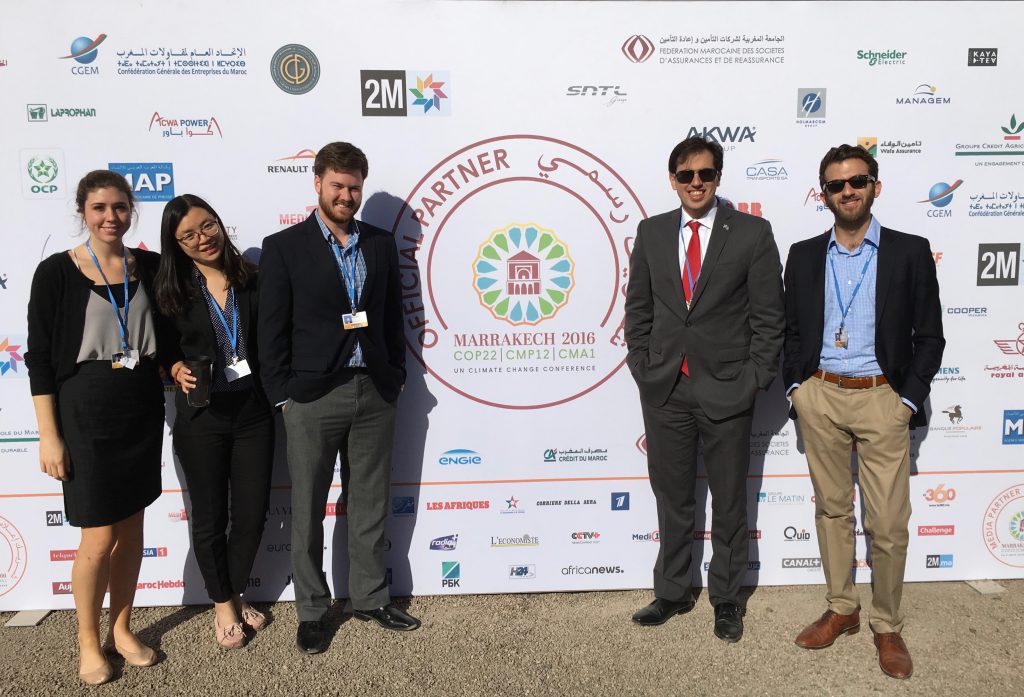Last week, I wrote about my cautious optimism heading into Marrakech, and my hope that the COP would provide some much-needed encouragement following the presidential election. Now, just two days into the second week of the conference, I’m relieved to see that my optimism wasn’t entirely unwarranted.
Like many others, I worried that last week’s news would suck the air and energy out of the COP. But if anything, it seems the election may have had the opposite effect. Throughout the past two days, speakers have indicated a renewed sense of urgency and an insistence that the uncertainty surrounding U.S. policy not impede global climate action. The Paris Agreement was such a monumental accomplishment in climate diplomacy that the international community seems determined to preserve its momentum. Don’t get me wrong: the election (and the anxiety it produced) is at the forefront of many of our minds. Still, I can’t overstate the level of enthusiasm that the Paris Agreement – and its rapid, unexpected entry into force earlier this month – seems to have injected into global climate talks. It remains to be seen, of course, whether this motivation sustains itself beyond the COP and turns into action; yet for the time being, all signs point to continued effort to address climate change.

It takes an event like this to truly appreciate the breadth and diversity of global climate action. The range of efforts and initiatives led by national, subnational, and non-state actors is astonishing, and perhaps enough to restore one’s faith in the convening power of the UNFCCC. As I mentioned last week, the COP is about much more than hashing out details of negotiating text. In fact, in just two days, I’ve realized that much of this year’s progress may have little to do with formal negotiations.
Among its many functions, the UNFCCC is a platform for the exchange of ideas and best practices. This was exemplified at yesterday’s launch of the NDC Partnership, an initiative led by the World Resources Institute (my client at the COP) and the governments of Morocco and Germany. The Partnership creates an opportunity for developed and developing countries to support one another in crafting, refining, and implementing their Nationally Determined Contributions (NDCs), the building blocks of the Paris Agreement. High-level delegates and ministers applauded the initiative’s goal of facilitating collaboration among all parties, and I was personally inspired by the leadership on display.

Source: UNFCCC
At the same time, as someone with a particular interest in this sort of policy- and commitment-making at the national level, I must admit the COP has been an eye-opening experience for me. While I’ve always been aware of the crucial role of subnational actors (states and cities) in addressing climate change, it wasn’t until this week that I truly appreciated their contributions to climate action. On Tuesday afternoon, I attended one panel, in particular, focused on action at the city, state, and regional levels. Ministers and mayors discussed the steps their respective localities – which can often act more quickly and creatively than their national governments – are taking to reduce emissions and improve climate resiliency.
The panel reminded me of the importance of perspective when considering climate action. We very easily get preoccupied wondering how the world will react to changes in domestic forces. And for good reason: the international community looks to the United States for leadership and direction on many fronts. But an event like this reminds us that leadership comes in many shapes and sizes. Others may look to the United States for leadership, but when confronted with its potential absence, they seem eager to step up to the plate. Countless countries, regions, provinces, cities, and businesses are no longer simply following, but rather carving out leadership roles of their own.
Taken together, these glimmers of hope may just embody the silver linings I so desperately sought in Marrakech. As I said earlier, only time will tell if and how ambition will translate into action. But after just three days at the COP, I remain hopeful.


 It’s been about two weeks since I returned from COP22, and since then I’ve spent quite a bit of time reflecting on the experience. My week in Marrakech was incredibly rewarding and, despite my post-election nerves, it managed to restore my faith in the future of global climate action. Still, as I look back on the conference, I must admit that it raised just as many questions as it provided answers.
It’s been about two weeks since I returned from COP22, and since then I’ve spent quite a bit of time reflecting on the experience. My week in Marrakech was incredibly rewarding and, despite my post-election nerves, it managed to restore my faith in the future of global climate action. Still, as I look back on the conference, I must admit that it raised just as many questions as it provided answers. And that’s okay! My experience at COP22 taught me that it’s perhaps misguided to label any given COP a “success” or “failure.” The annual meetings have truly astounding convening power, as they attract the best and brightest minds focused on climate action from nearly 200 countries. No other gathering can quite match the momentum built at events like the COP. And as I walked through the event halls and different countries’ pavilions, I couldn’t help but wonder whether the initiatives, funding, and partnerships announced in Marrakech would exist in the absence of the COP.
And that’s okay! My experience at COP22 taught me that it’s perhaps misguided to label any given COP a “success” or “failure.” The annual meetings have truly astounding convening power, as they attract the best and brightest minds focused on climate action from nearly 200 countries. No other gathering can quite match the momentum built at events like the COP. And as I walked through the event halls and different countries’ pavilions, I couldn’t help but wonder whether the initiatives, funding, and partnerships announced in Marrakech would exist in the absence of the COP.

